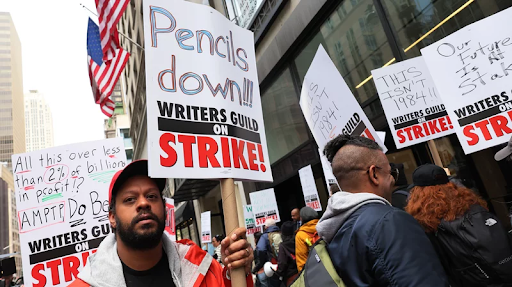|
Image C/O Michael M. Santiago/Getty Images By Andrew Martinez Cabrera Entertainment Editor On May 2, 2023, The Writer’s Guild of America (WGA) announced that all 11,500 union members were going on strike, effectively halting all film and television productions that require a writing staff. The strike authorization was preceded by a month of deliberation between the union, and once the contracts with the studios lapsed on May 1, the strike officially began.
The last time the WGA went on strike was in 2007, which lasted from November 5 to February 12, when writers were seeking an increase in residual rates from DVD sales. The issue now is still focused on residual rates, but concerns streaming services. What used to happen prior to streaming, to use the contemporary example, was that when a show was a success, it could get a lot of air time and stay in syndication. Whenever a particular episode would re-air on television, the writer would get compensation via a check from the studio. This continuous revenue stream was especially fruitful since most shows’ seasons would have an average of around 20 episodes per season, give or take. For these long seasons, writers are present for longer periods of time after the writers’ room has concluded, getting to learn the actual production aspects of making something. It ensured financial and career stability for writers, like Michael Schur, who started off writing for “The Office” before transitioning into being a showrunner for projects such as “The Good Place” and “Parks and Recreation.” What happens now is that streaming service companies like Netflix order about 8-10 episodes per season, which means less hired time for writers. Adding on to that, streaming companies adopted what is called a “mini room,” a pre-production writer’s room where the show is scripted and produced for the first time. According to The New York Times’ John Kroblin, streaming companies prefer mini rooms because of the semantics of it all, saying “Because it’s not a formal writers’ room, they will use that as justification to pay writers less, even though they’re writing scripts and developing a show.” When a show is a success, however, the companies hide the viewership data so that the writers cannot accurately know how much they’re owed for each episode once it lands on streaming. The WGA’s demands include viewership-based streaming residuals, regular staff fees, individual health benefits, longer employment periods, regulation on studios using artificial intelligence from either making projects or using writers’ previous works to train it, and many others which can be found on the official WGA website. Countering or rejecting their proposals is the Alliance of Motion Pictures and Television Producers (AMPTP), which represents all of the big Hollywood studios such as Disney, Netflix, and Warner Bros. Discovery. Looking at the annual cost the studios would have to pay to end the strikes, each is less than $100 million. For example, Warner Bros. Discovery would only have to pay $45 million, which is 0.104% of its annual revenue of $43.1 billion. Rather than agreeing to the guild’s terms, Warner Bros. Discovery announced that they would lose $300-$500 million from their 2023 earnings instead. Companies have also resorted to making more reality shows since they are not a part of the WGA, a pattern that started in 2007 and gave us the first reality TV boom that remodeled the television industry. Studios are also pushing back major releases in the hopes of having something to bring back their earnings in the upcoming year, such as pushing back Dune: Part Two to March rather than keeping it in its original November release date. In an attempt to further stall their agreement to the union’s demands, the AMPTP waited for writers to begin losing money and “start losing their apartments and losing their houses.” As the WGA described in a statement, multiple CEOs met with the union negotiators to talk and were “met with a lecture about how good their single and only counteroffer was.” Making matters worse for the AMPTP, the Screen Actors Guild and the American Foundation of Television and Radio Artists (SAG-AFTRA), a combination of two acting unions, have also gone on strike. Their demands are similar to the WGA’s. On the state level, California’s senate approved unemployment pay for any striking workers, not just the WGA and SAG-AFTRA on September 14, 2023. According to Variety, if signed by Governor Gavin Newson, “the bill would take effect on Jan. 1.” As of now, the WGA announced that negotiations will restart with the AMPTP this Wednesday. At the time of publication, the WGA strike has lasted 143 days compared to the 2007 Writers Strike which lasted 166 days. Sources https://www.nytimes.com/2023/05/10/insider/wga-writers-strike-explained.html?searchResultPosition=9 https://www.vanityfair.com/hollywood/2023/07/studios-allegedly-wont-end-strike-til-writers-start-losing-their-apartments#:~:text=A%20new%20report%20from%20Deadline,A%20cruel%20but%20necessary%20evil.%E2%80%9D https://www.theatlantic.com/ideas/archive/2023/08/hollywood-writers-strike-netflix-studios/674913/ https://www.wga.org/uploadedfiles/members/member_info/contract-2023/WGA_proposals.pdf https://www.rollingstone.com/tv-movies/tv-movie-features/writers-strike-2007-2008-wga-change-tv-breaking-bad-the-office-friday-night-lights-1234727839/ https://www.wsj.com/podcasts/the-journal/one-hollywood-writer-on-the-industrys-dire-situation/5e1f1082-587c-4691-b16c-77d5a1a774a5 https://www.wgacontract2023.org/announcements/negotiations-update-9-14-23 https://www.wgacontract2023.org/announcements/negotiations-update-8-22-23 https://variety.com/2023/film/news/dune-2-release-date-change-2024-warner-bros-strike-1235676007/ https://x.com/wgaeast/status/1699071397694464306?s=46&t=K4klQY7GosuTKasbcoyx-Q https://www.hollywoodreporter.com/business/business-news/warner-bros-discovery-strikes-earnings-impact-2023-1235581943/
0 Comments
Leave a Reply. |
STAFFMadison Sciba '24, Archives
October 2023
Categories |


 RSS Feed
RSS Feed